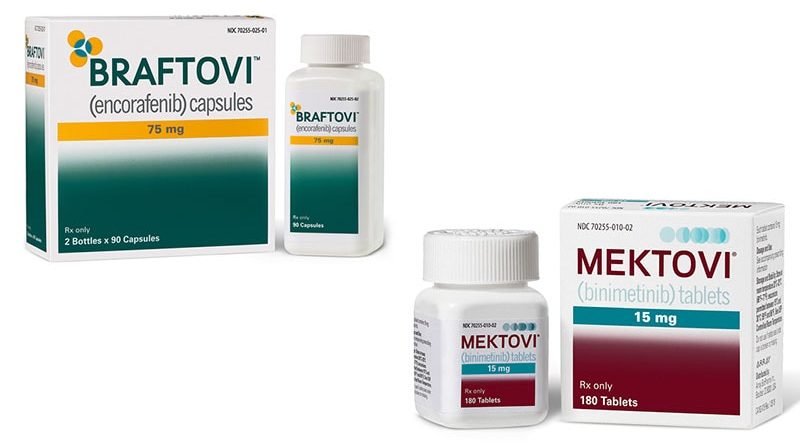FDA OKs Drug Combo in BRAF V600E-Mutated Metastatic NSCLC
The US Food and Drug Administration (FDA) has approved encorafenib (Braftovi, Pfizer) with binimetinib (Mektovi, Array BioPharma) for adults with metastatic non–small cell lung cancer (NSCLC) that carries a BRAF V600E mutation.
The agency also approved the FoundationOne CDx (tissue) and FoundationOne Liquid CDx (plasma) tests to detect the mutation. If it’s not detected in a plasma, the tumor tissue should be tested, the agency said in a press release announcing the October 11 approval.
About 2% of NSCLC patients carry a BRAF V600E mutation, which stimulates tumor cell growth and proliferation. “Targeting components of this pathway could potentially help inhibit tumor growth and proliferation caused by BRAF mutations,” Pfizer said in its own press release announcing the approval.
The approval was based on findings from the open-label, single-arm PHAROS study, which included 98 patients with metastatic BRAF V600E-mutated NSCLC. Prior treatment was allowed, but not with a BRAF or MEK inhibitor; encorafenib is a BRAF inhibitor, and binimetinib is a MEK inhibitor.
Among the 59 treatment-naive patients, 75% achieved an objective response — nine patients had a complete response, and 35 had partial responses. The median duration of response was not estimable by the data cutoff. Among the 39 previously treated patients, 46% achieved an objective response — four patients had a complete response, and 14 had partial responses. The median duration of response was 16.7 months.
Overall, the study “demonstrated that these patients could benefit from [the combination] targeted therapy regardless of their prior treatment history,” PHAROS researcher Gregory Riely, MD, PhD, a thoracic medical oncologist at Memorial Sloan Kettering Cancer Center in New York City, said. “Patients and providers now have another option to help personalize treatment plans based on individual risk factors and preferences.”
The most common adverse reactions, occurring in 25% or more of participants, included fatigue, nausea, diarrhea, musculoskeletal pain, vomiting, abdominal pain, visual impairment, constipation, dyspnea, rash, and cough.
Serious adverse reactions occurred in 38% of patients, including hemorrhage (6%), diarrhea (4.1%), anemia, dyspnea, pneumonia (3.1% each), arrhythmia, device-related infection, edema, myocardial infarction, and pleural effusion (2% each), plus fatal adverse intracranial hemorrhage (1%) and myocardial infarction (1%).
Adverse reactions led to permanent discontinuation of binimetinib in 17% of patients and permanent discontinuation of encorafenib in 16%.
The recommended doses are encorafenib 450 mg orally once daily and binimetinib 45 mg orally twice daily.
The combination is also approved for unresectable or metastatic BRAF V600E or V600K mutated melanoma. More detailed labeling information is available online.
M. Alexander Otto is a physician assistant with a master’s degree in medical science. He is an award-winning medical journalist who worked for several major news outlets before joining Medscape and is an MIT Knight Science Journalism fellow. Email: [email protected].
For more news, follow Medscape on Facebook, X, Instagram, and YouTube.
Source: Read Full Article
